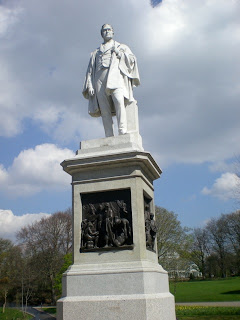The only census where Bryan was found was 1851 stating that he was born in Yorkshire about 1813 and was a servant in Liverpool. In attempting to build a story, a family history, it is tough when you have such limited information. But, with some curiosity and a little investigation, a tale can emerge.
Further checking records, we accumulated these facts about Bryan:
- born in Eston, Yorkshire to father Thomas, a farmer and unknown mother
- married Fanny Krebs in Liverpool in 1841, she was from Wales
- butler for the renowned Rathbone Family of Liverpool at Greenbank House
- had 3 daughters: Rosina, Fanny and Christina
- died of bronchitis in 1852 shortly before 5 year old daughter Fanny died and 6 months prior to birth of 3rd daughter, Christina
- buried at St Michael's Churchyard in Garston along with daughter Fanny
So, the story that unfolds is that Bryan held a prominent position in the household of the Rathbone family on a large property called Greenbank House. They were extremely prominent in Liverpool for generations. Bryan worked for William V who was honored with a large statue in Sefton Park.
The Rathbones were Quakers, wealthy merchants importing textiles from China, active social reformers responsible for establishing public baths and community nursing to avoid future cholera epidemics. William V (1787-1868) had been the Mayor of Liverpool and was mourned by 1000 at his own funeral. Obviously, Bryan encountered many famous and influential people in his role as butler in this household. Just knowing the identity of his employer greatly enhances what little we can report on him. Rosina's family had never thought of investigating who Bryan's employer was.
In the 1851 census Bryan was residing in the main Rathbone household while his wife and two young daughters were listed in another dwelling on the Greenbank property, she being listed as "butler's wife". Bryan was not even 40 when he died the following year. Sadly for his wife Fanny, his death placed her in a tenuous position -- apparently ousted from housing on the Rathbone estate with two young daughters, aged 9 and 5, and pregnant again. She was later found listed as a "smallwares dealer" in Garston, forced to find an occupation to support herself and her two surviving daughters.
The Rathbones were Quakers, wealthy merchants importing textiles from China, active social reformers responsible for establishing public baths and community nursing to avoid future cholera epidemics. William V (1787-1868) had been the Mayor of Liverpool and was mourned by 1000 at his own funeral. Obviously, Bryan encountered many famous and influential people in his role as butler in this household. Just knowing the identity of his employer greatly enhances what little we can report on him. Rosina's family had never thought of investigating who Bryan's employer was.
In the 1851 census Bryan was residing in the main Rathbone household while his wife and two young daughters were listed in another dwelling on the Greenbank property, she being listed as "butler's wife". Bryan was not even 40 when he died the following year. Sadly for his wife Fanny, his death placed her in a tenuous position -- apparently ousted from housing on the Rathbone estate with two young daughters, aged 9 and 5, and pregnant again. She was later found listed as a "smallwares dealer" in Garston, forced to find an occupation to support herself and her two surviving daughters.
There had been some confusion over Fanny and Bryan's children as both the second daughter (who died at age 5) and the third were named Frances. In verifying that the youngest daughter was indeed named Frances Christina, her christening record at St Anne's in Aigburth was examined. It clearly listed her name plus both of her parents.
The record above hers on the page caught my eye as it was William Krebs Hill. Krebs is not that common a name -- some additional checking revealed that his mother was Betsey Krebs Hill, Fanny's sister who also lived in Garston. So, the sisters from Wales were living near each other and had babies in the same month of 1852. That might make the end of Fanny's story a bit happier.









No comments:
Post a Comment